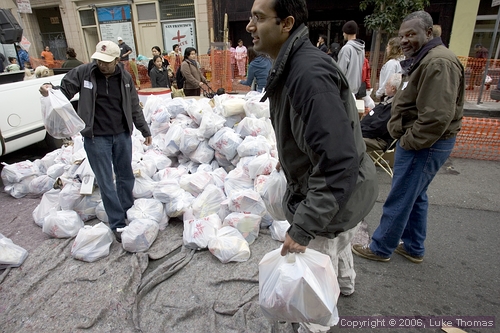
In these tough economic times, a record 49.1 million Americans are living below the federal poverty line, according to a recent Salvation Army survey. File photo by Luke Thomas.
May 25, 2012
A record 49.1 million Americans (16 percent) are living below the federal poverty line, according to a recent survey. Considering the U.S. is one of the richest nations in the world, the results are sobering.
A family of four earning less that $23,050 per year is considered living in poverty.
According to the Salvation Army’s “Perceptions of Poverty” survey, 38 percent of Americans report receiving some form of charitable assistance, including food from food banks or financial assistance/housing support; 63 percent who earn less than $25,000 per year report receiving assistance; and among Americans ages 35 to 54, 46 percent report having received assistance at some point in their lifetimes.
Thirteen percent of Americans report having spent a night in a shelter or on the street due to loss of housing and 26 percent who earn less than $25,000 per year report sleeping in a shelter or on the street.
The survey found that most Americans believe a helping hand is needed to escape poverty, but there is a significant minority with a definite animus toward the poor:- They are poor because they are lazy; they have lower moral values; the poor will take advantage if given more assistance; and the poor just need a good work ethic to escape poverty, etc. It follows, then, that the further one is away from poverty, the less likely that he or she accepts the reality of poverty.
Additionally. there are widely-held mis-perceptions regarding poverty, according to the survey, with 59 percent of Americans believing poverty is a trap that no matter how hard they try, those stricken by poverty cannot escape. Fifty-five percent believe it is not possible to eliminate poverty altogether while 32 percent believe there is nothing much they can do to help poor people.
The survey did find, however, that 59 percent of Americans report donating to charities in 2011. As would be expected, the prevalence of charitable donations increased with income. Seventy percent of Americans earning more than $50,000 per year report donating to charities. Although the more affluent may donate a higher dollar amount to charities, it does not necessarily follow that affluent Americans gift a larger percentage of their incomes to charities.
The Census Bureau has been developing an alternative measure of poverty that is intended to better reflect the costs of basic living expenses, as well as the resources people have to pay them. Under this alternative measure, the poverty level in 2010 for Hispanics was 28.2 percent; for Whites, 11.1 percent; for Blacks, 25.4 percent; and for Asians, 16.7 percent.
Part of the problem of poverty in these difficult economic times is the high unemployment rate. According the the Bureau of Labor Statistics, the nation’s unemployment rate (seasonally adjusted) in April 2012 was 8.7 percent (10.9 percent in California) with about 370,000 Americans seeking unemployment benefits. The unemployment rate is actually higher as it does not include discouraged workers not currently looking for work because they believe no jobs are available for them.
Exacerbating the problem of poverty is that when budget crunch time comes, politicians seem to target for elimination or reduction the safety nets desperately needed by the poor.
There is no secret as to what is needed to significantly reduce poverty. We must expand decent jobs and government assistance programs, redirecting national resources away from the rich and toward those with low incomes. Easier said than done.


 The Hunger Site
The Hunger Site
May 25, 2012 at 12:44 pm
Jobs, Jobs and jobs. Free trade agreements have shipped jobs to China and elsewhere, and the 10 million illegal immigrants have driven down the price of labor and increased competition here. This combination is driving the middle class out of existance. Add to that a growing dependency on government to supply “free” food, shelter, health care, public transit, and more. These “entitlements” (who says people are entitled? to all this) are more nails in the coffin. $75Billion for food stamps, a program most agree with rife with corruption. Everyone in SF likes to bitch about the 1%, but no one talks about the 52% of Americans that don’t pay income tax. BS – everyone should pay. The same %. If 1% have 90% of the income, they should pay 90% of the tax, but what about the rest? Everyone should have skin in the game.
May 25, 2012 at 8:45 am
Americans may also believe that the rich are rich because they are smart and work hard. It’s becoming less and less true (example: Mitt Romney’s kids are worth $100 million just by being born in the “right” family)
May 25, 2012 at 12:46 pm
Guess what – smart, hard working people like Barak Obama do succeed, at least more often than drop outs and people who make bad choices that lead to alcoholism and drug addiction.